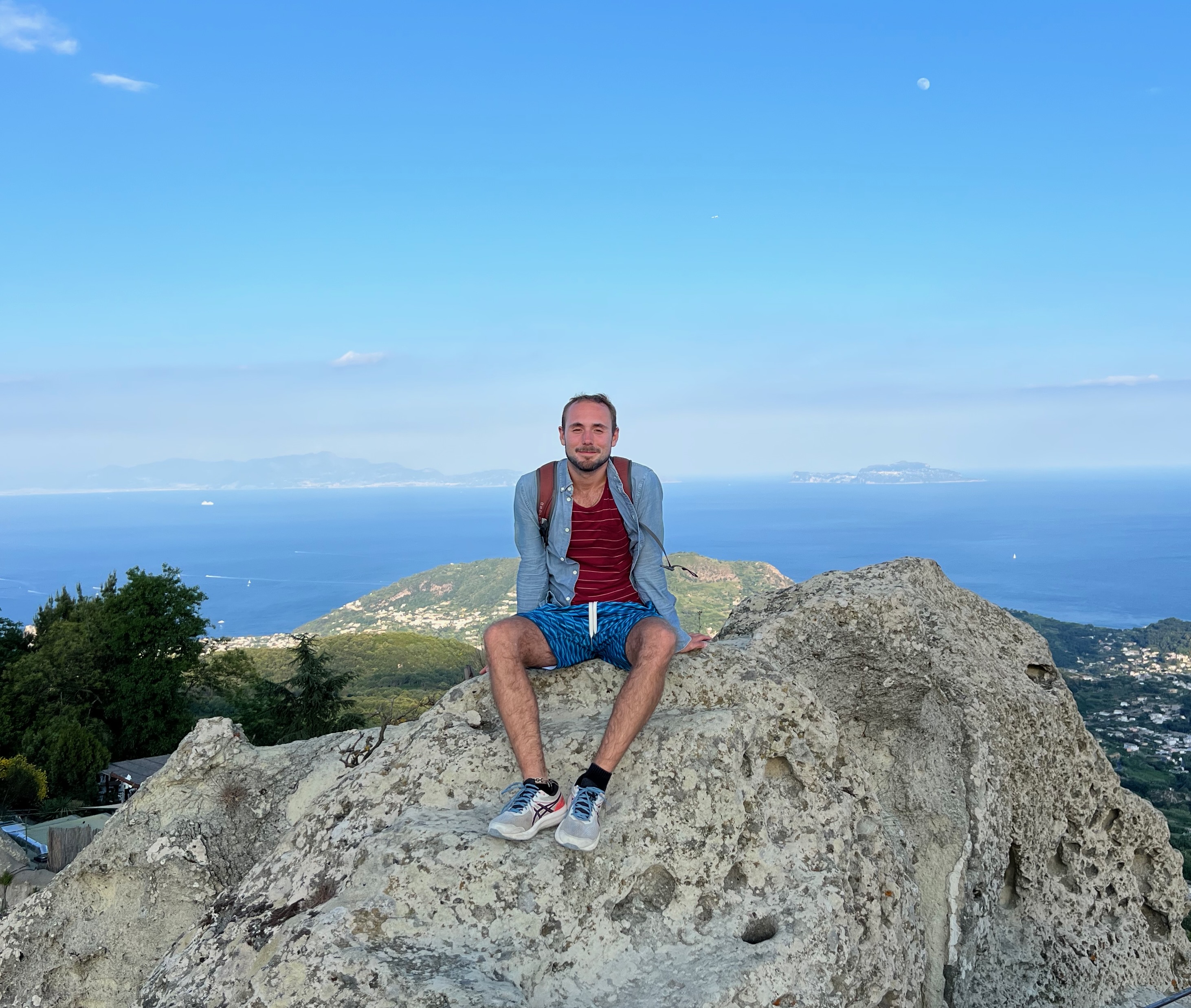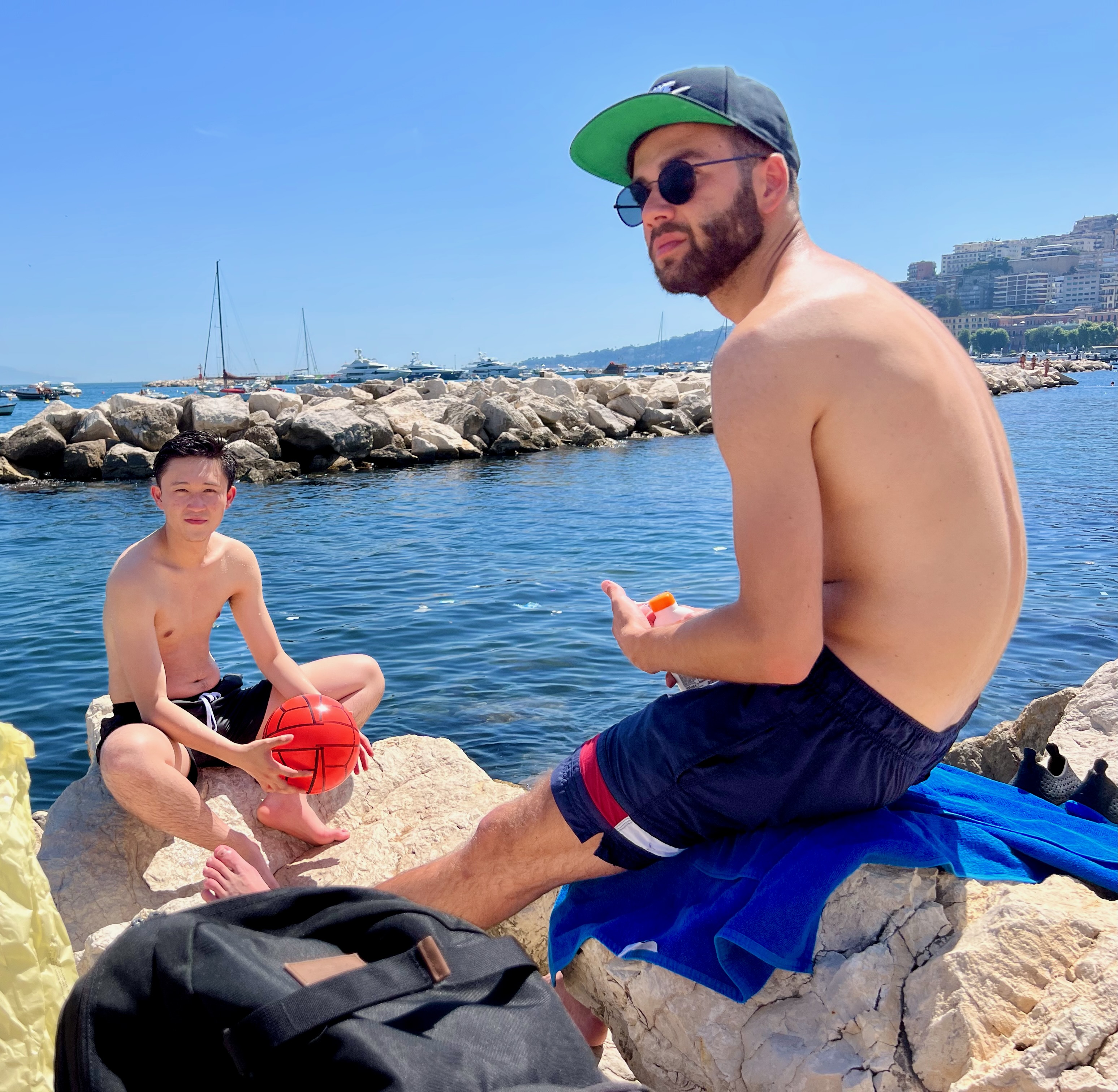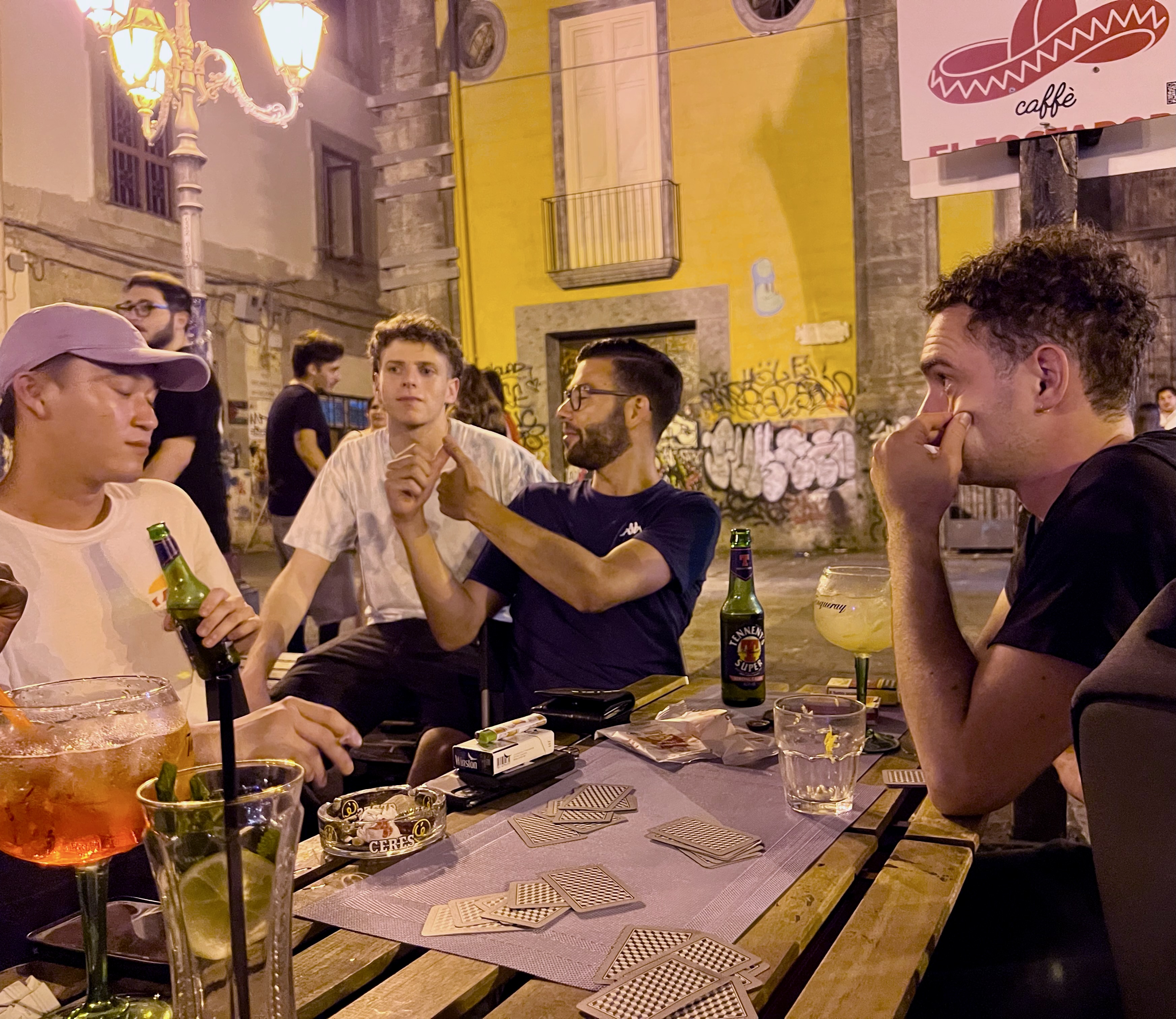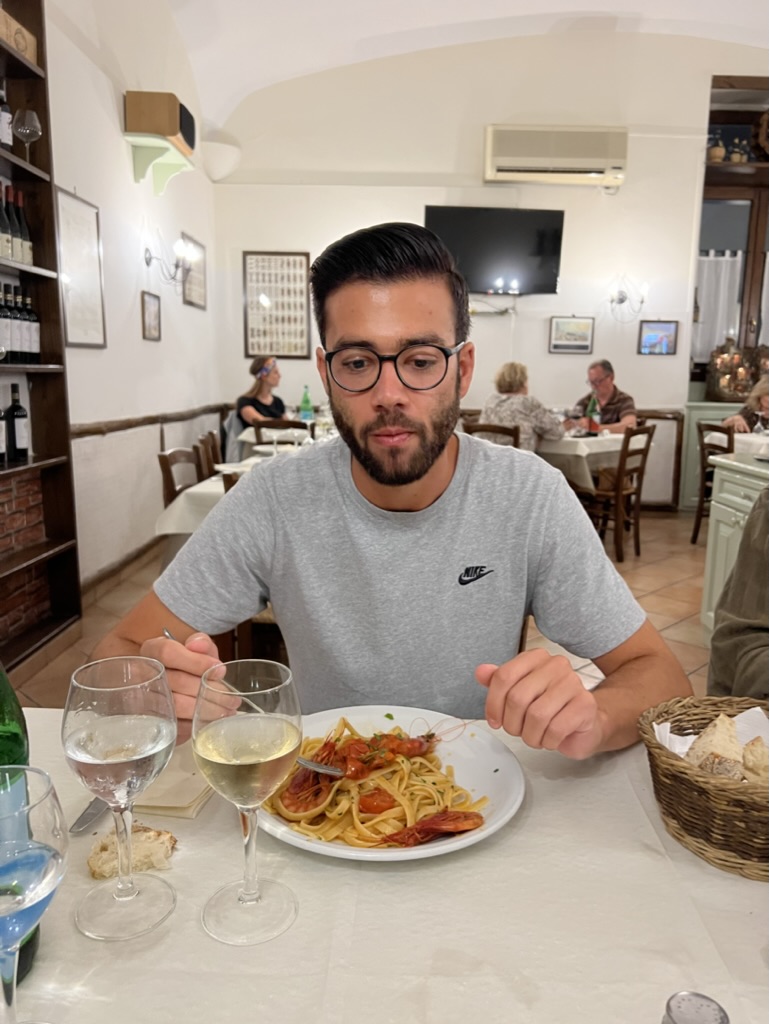
Last Week in Naples
Today was the last day of my Italian class in Naples. After class, we had a small ceremony in which the head teacher performed a pastiche of the Queen of England and, using the Italian flag wrapped around a broomstick, “knighted” each of us who were graduating from the school. We were each also handed a certificate stating how many hours of coursework we had completed. I looked down at mine and almost balked at the number. Had I really spent 70 hours this month seated in that chair on the other side of the room? It dawned on me in that moment how much work it really is to learn a new language. More on that below.

As I write this, I’m seated on a ferry headed for the island of Ischia, where I’ll spend my last weekend in southern Italy. I’m seated facing rearwards of the ship and as I watch the city of Naples get smaller and smaller against the expanding foreground of the Mediterranean sea, I’m feeling nostalgic for the month that I spent here. I can trace with my finger the very path that I followed in my exploratory efforts. First in the city center, spreading out to the near suburbs, then Ercolano and Pompeii and Vesuvius. Then the cliffs and beaches of Bagnoli and Bacoli. Finally, as the city becomes itself just a small blip on the horizon, I can see the entire amalfi coast, which I spent an entire liberating day riding along with my beloved motorcycle.
For anyone reading this who feels that life moves too quickly, I highly recommend trying to find a way to spend a month exploring a new city. The last month of my life feels like at least 8 months worth of experiences. At the risk of getting too self-indulgent here (on my personal blog, lol), as I scan the coastline and reflect on merely the physical locations that I have found myself at over the last few weeks, my mind is flooding with memories and impressions, recently formed, but of which some already feel almost ancient and mythological. It’s hard to believe that at the beginning of May, the only thing I knew about Naples was that it was kind of close to that famous volcano and that it had good pizza. Although I’m by no means an expert now, I feel like the personal growth and development I’ve had in this city makes me feel a certain closeness to it. I’ve developed a familiarity and attachment that is surprising. I feel lucky to have been able to spend this time of my life in a city so ancient, so storied, and so welcoming. I’ll be sad to leave it behind in a few days when I move on to the next phase of my Italian summer and head up north to Bologna.
The Babies Grow Up
In my last post, I talked about how I thought of my nascent social circle of foreigners trying to learn Italian together as a bunch of walking babies who can talk. Well, one of the beautiful things about having a circle like this in an intensive language program is that you get to watch these babies grow up together, in a way. Every day, we all spend the mornings with our teachers and our books, formally studying the language and making progress through its various stages. In the evening, we get together and put these concepts to use. Theory and Praxis. As our knowledge of the language grows and changes, so too does our ability to actually interact and communicate with one another. Ontology recapitulates phylogeny. It’s actually a wonderful thing to experience in real time. I’ve taken enough language classes at this point to recognize the patterns here, and they are almost always the same.
The first week of learning a new language is always tough. Even the more advanced of the beginners aren’t yet in possession of a good way to talk about the past, let alone any form of conditional, and therefore conversation is limited to immediate and merely factual matters. “Where do you live?” “Do you like the pizza here?” “I do not eat olives.” “The weather is pleasant.” While conversation and cultural exchange is somewhat possible at this stage, it’s usually pretty frustrating and awkward. Those in possession of another shared language (often English) will fall back on this in order to actually get any business done.

While most students will remain stuck in this mire of forced pragmatism for at least a few days, inevitably, at least one student will obtain an early grasp of modal verbs, the equivalents of can, need to, should, would like to. Armed with the linguistic ability to make suggestions (“Today we should go eat a pizza together.”) and speak to wait staff (“Can we have a table for six?”), this student naturally emerges as a sort of group leader. It’s truly incredible how powerful these few verbs and their attendant grammatical structures are. And given their relative simplicity (at least in Indo-European languages), it baffles me a little bit that more language programs don’t formally teach these sooner. I challenge those of you reading this who haven’t learned another language before, or recently, to pay attention to how often you say just the word “can.” Now imagine going a whole week without using it. Talk about bang for your buck!
Once the students are out on the town, eating food, visiting museums, drinking beers, navigating public transport, and seeking out visual high ground together, it’s off to the races.

The next linguistic milestone comes in the form of the past tense. By now, limited to the present (and depending on the language, near future), the students will know all about each other’s living situations, habits, near future plans, and the exact makeup of their family, including the exact number of cousins, uncles, and aunts everyone has. Until one has at least a basic way of talking about the past, it’s hard to really learn too much about the histories of your fellow students. Necessity will occasionally dictate an awkward, if not entirely ineffective attempt at expressing the past, usually just by throwing the word yesterday in the sentence and making a physical gesture over one’s shoulder: “You have a phone yesterday? Yesterday how do you find a SIM card? Yesterday it is easy to get?”
After a few days, once everyone formally learns the past tense during morning classes, a new era of conversation dawns. Entire new rivers of information, stories, and past experiences are waiting to spring forth from the students, who are eager to finally be able to share the things that have shaped them and brought them to their current place in life with their new friends. But for languages with grammatically complicated past tenses, even if the subterranean flows or mountain reservoirs of this desire to share are brimming and highly pressurized, the actual verbal outflow of these experiences can be, well, little more than a slow, painful trickle. (English is blessed in this regard, as our past tense is mostly just formed by sticking an “-ed” onto every verb and calling it a day.)
It’s hard to really explain how much patience can be required during this phase. You know that feeling when someone at a dinner party is telling an entirely too long story, and everyone is just sort of nodding and waiting for it to be over? Now imagine if it took about 30–40 seconds of slow, carefully planned, and error-ridden speech to produce each small detail of that story. “I was… I had went to… I was going to university in Chicago. It was being good. My apartment, it… was… being close to the… main buildings. And then…” But when everyone is at the same level, and on the same page, it doesn’t matter. Each student is just so excited to finally be able to express and learn things about the others that the inconvenience seems surmountable—after all, it’s all in the service of learning, isn’t it?

The last phase one is likely to encounter in the first month of learning a language is brought on by the acquisition of the conditional. Until this point, any statement that one is able to make, be it past, present, or future, is a matter of fact statement. This happened. This is. This will happen (said with certainty). But this, of course, is not how most actual language works. Much of what is commonly said falls somewhere else on the continuum of fact–irreality. To test this on your own, pay attention to how often you use the word “if” over the next day or so. “If the store is open, then…” “If I had seen it earlier, I would have…” “I wouldn’t do that, if I were you.” Conditional phases are also a key to sounding polite in many languages. Imagine ordering food or dealing with a civil servant and instead of saying “I would like…” or “Could you please…” you constantly fired off a snappy “I want this!” or “Do this!”
Once the students have some knowledge and experience with the conditional under their belts, things really start moving. Conversations still take about 10-25x longer than they ever would if everyone were fluent in the language, but the scope of what can be expressed starts to approach something that feels much more natural—as long as you are patient, that is.
Of course, there is still so so so much to be learned and mastered at this point. The journey to fluency has just begun. But at the same time, after a solid month of intensely studying, practicing, and stumbling through a foreign language, you can get over the awkward hump that makes the language truly “foreign.” You’ll have the tools you’ll need to express yourself in an astounding variety of situations, albeit simply and slowly. The world around you transforms from a backdrop of white-noise-like babble that feels separate and impenetrable to something you can actually interact with, first as an humble observer, and later as an actual participant. There’s pros and cons to this transformation, of course, but that’s for another blog post. But to be able to watch and co-experience this transformation alongside your new friends, who are taking every step with you? It’s truly a beautiful thing, and I can’t recommend something more to those of you who might be curious about experiencing it.
